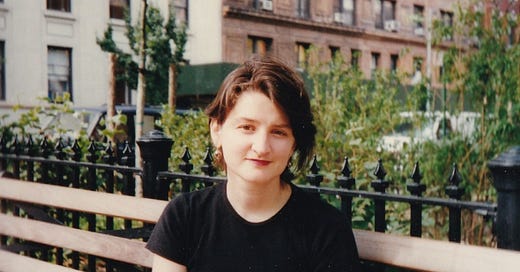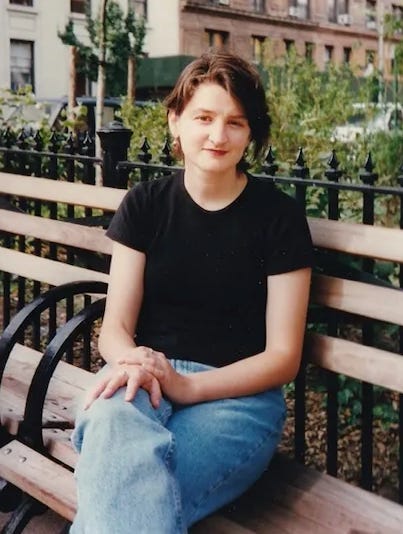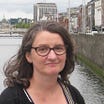Letter To My Younger Self #2: You Are Here
Sara Eckel writes to the 25-year-old she once was, just starting out as a writer in New York City in the 90s.
This essay is the second in a new Oldster Magazine series, “Letter to My younger Self.” The first was “Batman, Robin, and Me” by Jay Blotcher.
There you are, a 25-year-old woman sitting at an outdoor table at the Hungarian Pastry Shop with a spiral-bound notebook, a Mona Simpson novel, and a cappuccino in a heavy white diner mug. Across the street, peacocks wander the grounds of the Cathedral of St. John the Divine. You sit upright with your pen in hand, notebook open. You’re waiting for inspiration. You’re waiting for your life to start.
“I’m an editor, and I live in Manhattan.” This is a thing you get to say—to old high school classmates, to friends of friends, to a hypothetical attractive man who might strike up a conversation about the bizarreness of free-range peacocks in New York City. If that ever happens, which it never does.
Your life synopsis sounds good, but it implies something that isn’t true. It implies that you have a life in New York—that you are taking lunches with writers and attending literary parties or have any social life at all. But although you have lived in New York for two years, you still don’t feel like a part of New York. You’re still pressing your nose against the glass, trying to figure out how to traverse the invisible, immeasurable gulf to the other side.
You sit upright with your pen in hand, notebook open. You’re waiting for inspiration. You’re waiting for your life to start.
The Hungarian Pastry Shop is a place where you can almost convince yourself that you’ve arrived, a place where you can squeeze your way to a scratched wooden table and sit by yourself and not feel weird. It is 1991, so there are no Starbucks and no laptops. There is no social media or online meetup groups—there is no internet. (Although two years from now you will read an article in Time magazine about the coming “Information Superhighway” and think, “Huh, this sounds like a big deal.”)
Right before you moved to New York, you were offered two jobs—as a receptionist at a prestigious literary agency and as an editor at a newspaper syndicate. Your college writing teacher nudged you toward the literary agency job, and you were puzzled. Why would I want to be a receptionist when I could be an editor? you asked. Because it will give you access to the world you want to be in, he said. At 23, you didn’t get it. At 25, you do.
You are proud of your editor job. Each morning you glide up the Grand Central Station escalators to the Pam Am building, the looming skyscraper bisecting Park Ave. You have a Rolodex full of columnists who must file to you each week. If they miss their deadlines, which they do a lot, you tell them this is unacceptable. You have the Associated Press on your back, so they’d better get their copy in! This makes you feel very grown up.
But although you have lived in New York for two years, you still don’t feel like a part of New York. You’re still pressing your nose against the glass, trying to figure out how to traverse the invisible, immeasurable gulf to the other side.
But your teacher was right. You might not be transferring phone calls or scheduling lunches, but you’re also not getting anywhere. The lifestyle columns on coupon-clipping and home-decorating that you edit are distributed to the daily newspapers of America—the Columbus Dispatch, the Fort Worth Star-Telegram. Nothing that you do intersects with the New York City publishing world. You adore your co-workers, but they are ancient (like, 30) and they don’t seem to have any more access to the publishing industry than you do. Occasionally, you all get after-work beers at a midtown bar and grill called Meet Me at McAnn’s before people hit the train back to New Jersey or Long Island. You have a good time, and then you go home to your tiny, dark room at a fancy Upper West Side address.
On weekends, you wander around the city, feeling fierce envy for the groups of friends eating brunch at sidewalk cafes and having picnics in Central Park. When you return to your pitch-black room, you turn on the overhead lightbulb and write short stories on your KayPro computer, carefully crafting your sentences in pointillist green letters on the black screen. Sometimes you re-read the comments from your writing group on your last short story. You flip through the dot-matrix printouts, reveling in their praise—the penciled comments in the margins that say, “LOVE this!!!” and “nice!” plus the dear, unadorned check-mark ticks of approval. Without a romantic partner or really any social life, this is your most powerful form of emotional sustenance.
Next to your coworkers, that is. As you ride the Pan Am escalator on Monday you feel relieved that the solitary weekend is over, ready to relax into another week of making wisecracks with your colleagues and yelling at your columnists.
Sometimes you re-read the comments from your writing group on your last short story. You flip through the dot-matrix printouts, reveling in their praise—the penciled comments in the margins that say, “LOVE this!!!” and “nice!” plus the dear, unadorned check-mark ticks of approval.
First, the good news: It takes a long time, but you get where you want to go. At 27, you become an opinion columnist for the newspaper syndicate, and at 28 you quit the editing job to write full time. At 31, you’re earning $2 a word for your magazine pieces. On weekends, you meet your smart, funny friends at rooftop gardens and sidewalk cafes. You never take this for granted.
In your 40s, during the golden Obama-era years, you fall in love and marry. You publish a book that a lot of people like. The loneliness and desolation you’re feeling now will one day be harvested into a piece of writing that helps many people.
Some less-great stuff happens too, most notably the collapse of your profession—that $2 a word is the most you’ll ever be paid for journalism. When you’re 44, three different editors will decline to assign you a story, explaining, “We have bloggers who will write that for free.”
You get a corporate gig to support your journalism, and you start seriously studying Buddhism and meditation. This is when you decide that the question you’ve been asking—“How can I be successful?”—is the wrong question. You learn to focus on a better question, “How can I be useful?” You start thinking of alternative careers in that vein, studying the curriculums of graduate-school programs in social work, occupational therapy and library science.
The question, “How can I be useful?” is actually what revives your career. It sparks the idea for your book, and after it’s published you receive hundreds of letters from people all over the world telling you how much the book helped them. The book is published in ten languages. It is optioned by a famous television actor and then later by the creators of a brilliant and subversive TV show about teenagers. It does not make you rich—sorry! But it does give you confidence that you have something to say, that your words have value. For a while, anyway.
That $2 a word is the most you’ll ever be paid for journalism. When you’re 44, three different editors will decline to assign you a story, explaining, “We have bloggers who will write that for free.”
The year you turn 50, a common criminal is elected president of the United States. Two years later, the leader of the Buddhist organization you belong to flees to another country after he is accused of sexual misconduct. The world proceeds to get shittier and shittier. Or, you fear, the world remains as shitty as it always was—the difference being that now the shit has bubbled to the surface.
You double-down on the question, How can I be useful? But the answer feels less clear. You do some low-level activism—door knocking, phone-banking. You go to City Hall and make public statements on environmental ordinances. You attend local activism meetings where the competent professional leading the group repeatedly tries to steer the conversation back to the task at hand—the next legal filing or zoning-board meeting. You admire her unfailing patience as she endures long, condescending history lessons from over-60 white guys and endless debates about how to organize the potluck and whether or not to print T-shirts.
In theory, you believe in the idea of being a tiny cog in a large wheel of social justice. But when the meeting is over, you don’t like what you see in the mirror: A powerless middle-aged lady doing the low-level work of democracy that elder ladies have aways done. A corporate ghostwriter who excels at channeling other people’s voices but has lost her own. You diligently carve out time for “your own work,” but the brazen stupidity of the world has left you mute.
You get a corporate gig to support your journalism, and you start seriously studying Buddhism and meditation. This is when you decide that the question you’ve been asking—“How can I be successful?”—is the wrong question. You learn to focus on a better question, “How can I be useful?”
So there you are, a 56-year-old woman sitting by the window of an artisanal bakery, wondering what to do with herself, typing notes for this essay into her phone.
Of course, that’s the true point of an exercise like this, conjuring some kind of wisdom for your current-day self. After all, the 25-year-old is gone. You can do nothing to prevent the sadness she is feeling—or the heartache and loneliness to come. You can see her mistakes, but you can’t prevent her from making them.
Ditto the 44-year-old. You did not go to graduate school. You did not become a schoolteacher or a psychiatric nurse. You also did not open a liquor store, an idea you cooked up with your husband based on the theory that, unlike writing, people will always pay for booze.
You stayed true to the 25-year-old’s vision. You have left yourself with no choice but to honor that.
She was clueless, sure. Self-involved and self-pitying—yes, yes. But she also had talent and she worked extremely hard to develop it. Every day she faced down her confusion and self-doubt. In her dark bedroom, she pulled the string of the naked lightbulb on the ceiling and sat down at the KayPro computer. In the crowded cafe, she wrote about the peacocks. She filled the pages of that spiral-bound notebook, trying to make sense of the world, convinced that she had something to offer it.









I can't begin to express how much these comments mean to me. The past two years have been tough for me, writing-wise, and I haven't felt very useful. This has lifted my spirits tremendously. Thank you. I am very happy to be part of this community.
Oh my. I just took a mini break as I am re writing some short stories to be linked as a memoir. At 73, now, not sure I’ll ever finish, but that is the case at any age. So I continue on. How can I be of use? What will my impact be? Or will my writing even have an impact? I’ve long since five. Up worrying about it. But am most grateful whe one single person reads my writing and finds it resonates or inspires or is simply enjoyable.
This article offered me all three reactions.
What a wonderful morning joy. Thank you.